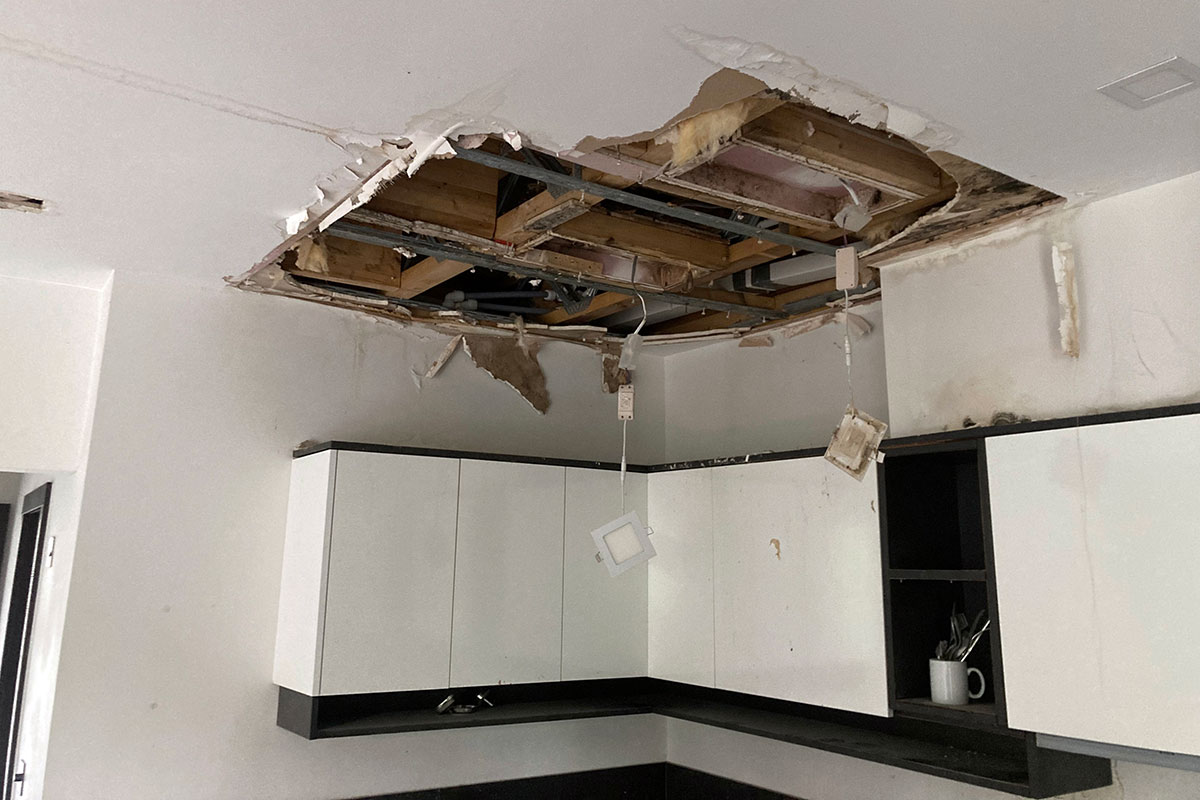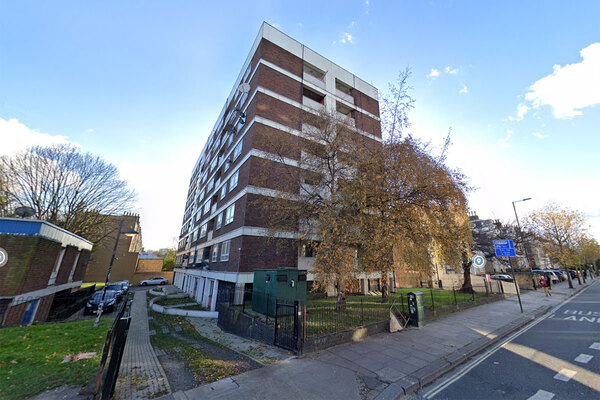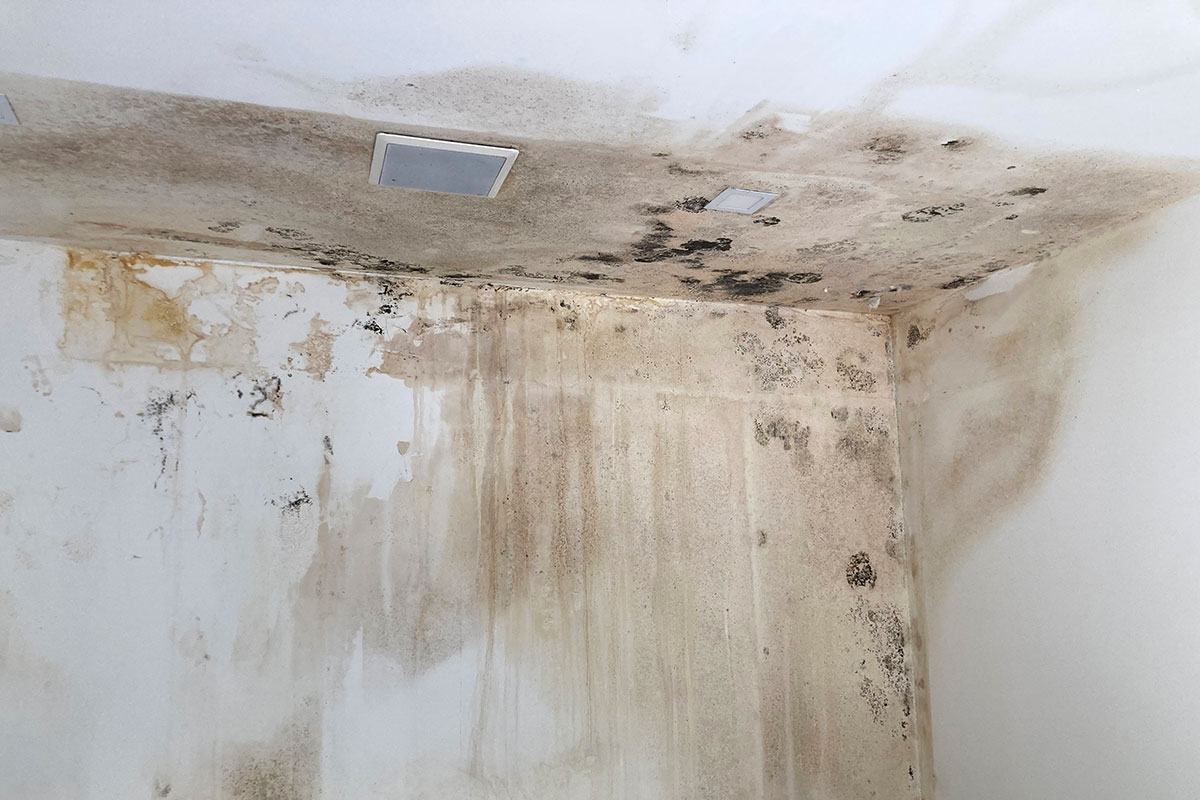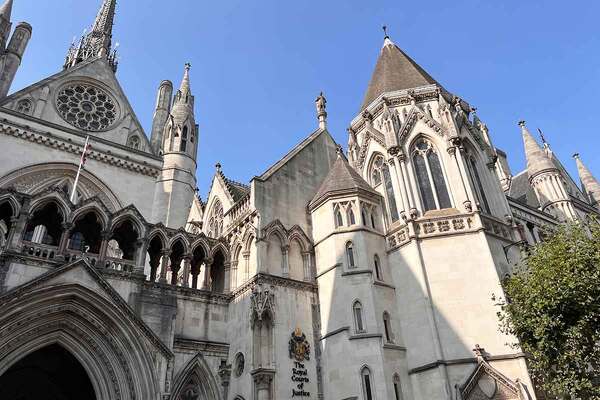You are viewing 1 of your 1 free articles
The leasehold problem – whose responsibility are repairs?
The question of who should pay to fix construction defects in leasehold properties has still not been resolved. James Riding talks to a resident who has been struggling for years to find a solution to his “living hell”

Dan Bruce always keeps a backpack by the door of his top-floor flat. His “go bag” is prepacked with a laptop, medication and other essentials. Every night, Dan goes to sleep in a building with a rotting wooden frame, cracking ceiling, sagging roof, rusting fixtures and a brick façade that is slowly, but visibly, cracking.
This Camden block was only completed in 2018. Dan bought his two-bedroom flat early the following year for £850,000. Since then, he and his neighbours have spent five years and £350,000 in legal fees in what he calls “a living hell”, trying to get redress from insurers.
The local MP has even weighed in. Luckily, come July, this MP – Sir Keir Starmer – might be in a position to do something about beleaguered leaseholders (see box below).
So what could the next government do to help people trapped in defective new builds? And, as he pledges to scale up housebuilding, how can Sir Keir ensure he does not condemn other people to the same fate?
Leasehold reform lags behind
Sitting in Dan’s open-plan living room on the pretty north London street of Agar Grove, with sunlight streaming in through a tall glass door, his flat seems highly desirable.
Dan explains that he regularly patches up defects. Only some hairline cracks and peeling paint around the window, as well as a small oblong chunk cut out of the ceiling, hint at the fragility of his situation.
A gust of eggy sulphur smell drifts in from the terrace. Sewage issues, Dan says. Damp also blooms on the building’s brickwork and pools form on the balconies.
But if you visit other flats, the problems are impossible to paper over. Three of the seven flats in the building are now abandoned, bar infrequent inspections from Prime Metro Properties, the block’s developer and freeholder.
We walk downstairs (the block’s lift has been out of service for years) to a flat with an identical layout to Dan’s. Mould spans the wall from floor to ceiling. Great hunks of the ceiling are torn out, exposing bowed, rusting metal fixtures – the fixtures holding up Dan’s flat. Dirt and plaster are strewn across the floor. We then step onto the balcony of Dan’s neighbour, Adam, where you can see a giant crack in the brick facade around four metres long, zigzagging diagonally up.
Alex Druzhin, another neighbour, discovered the first defects a month after moving in. “Both of my bedrooms have got a massive leak from the terrace above and it’s been going on for months and months,” she says. It had been “masked with silicone and pink foam”, she says. She claimed on her structural warranty, and the warranty company forced the block’s builder, Cite Construction, to rebuild the terrace completely. Six months later, it leaked again.
“It’s just terrible build quality,” says Dan.
An independent survey commissioned in 2022 by Prime Metro Properties agreed. It concluded the building was “not fit for purpose” and with such extensive damage to the timber frame, it would be so expensive to fix that the only solution may be to demolish and rebuild it.
Labour Party leader Sir Keir blames Dan’s plight on the leasehold system, which came under fire in the post-Grenfell building safety crisis. For years, leaseholders were trapped in unsafe buildings and saddled with huge cladding replacement bills until the government mandated developers to help cover the costs. Many leaseholders in smaller blocks are still trapped, as the Building Safety Act 2022 only covers buildings taller than 11 metres (Dan’s building is just below this height).
Days after Rishi Sunak called the general election, the Leasehold and Freehold Reform Act 2024 was rushed onto the statute books. It banned the sale of leasehold houses (but not flats), increased lease extension terms and made freeholders issue service charge bills in a clearer format. However, a plan to cap ground rents at £250 a year was scrapped.
Labour says the law does not go far enough. The party’s election manifesto says it will ban new leasehold flats, enact proposals made by the Law Commission in 2020 on leasehold enfranchisement, right to manage and commonhold, and act to address “unregulated and unaffordable ground rent charges” to ensure commonhold is “the default tenure” and “finally bring the feudal leasehold system to an end”.
Dan does have criticism of leasehold: since he was not the ultimate owner of the building, he was unable to conduct intrusive surveys and relied on the freeholder to do this. Fundamentally, though, he sees his situation as an issue of consumer rights.
“Builders can build what they want, and nobody knows until it’s too late,” he says. “There’s no consumer protection, whether you’re buying a leasehold flat or a detached house.” He suggests that if a claim is worth more than 10% of a building’s value, there should be an automatic legislated refund from insurers.
The Building Safety Regulator, established in 2022, checks that designs for new blocks taller than 18 metres address fire safety before they are granted planning permission. Again, though, a building the height of Dan’s would be too short to fall under this regulation.
He is also campaigning to stop Darren Clarke, the director of the company that built his block, from building more homes. Mr Clarke has planning permission for up to 40 new homes across the Midlands. Among these approvals, Mr Clarke was granted permission in November 2022 by Redditch Borough Council to convert a warehouse into flats.
Dan says he felt responsible to raise the issue with the MPs of the constituencies where Mr Clarke had been given planning permission, including former housing minister Rachel Maclean, the MP for Redditch.
Sir Keir Starmer’s view
Inside Housing asked Sir Keir Starmer (above), Dan’s local MP, about the situation. He said: “I asked the secretary of state to intervene in this appalling case. Yet despite his personal commitments to resolve this matter, no real progress has been made. The buck is continually passed: from freeholder, to developer, to insurers.
“Meanwhile, my constituents are trapped in a failing, unsafe building with unsaleable homes and a mountain of legal bills. The government must play their part and seek a resolution. My constituents cannot be left paying the cost of a broken system. Yet the reality of our leasehold system means that they could be hit with even more bills. This must not happen.
“Everyone deserves a safe and secure home. This case demonstrates why we must end the broken leasehold system as we know it. People who do the right thing to get on the housing ladder must be given greater protections.”
He received a response from Ms Maclean, saying the issue caused her “great concern”, adding: “Allow me to spend some time considering the best next steps.” Her office did not reply to an approach for further comment from Inside Housing.
Legal responsibility unclear
Dan says the law should be changed. “A builder shouldn’t be able to build defective premises even in one instance, because it’s ruinous,” he says. “But, if a builder builds something and it’s later found out that that thing is defective, the builder should not be allowed to continue building until a) they’ve made it right for the people who they harmed in the first instance, and b) proven that this will not happen again.
“There needs to be some really strong consumer protections around the building and the sale of homes through private individuals.”
The Construction Industry Council wrote to Dan and his neighbours in February, saying it was investigating Agar Grove’s building control sign-off in 2018.
Mr Clarke tells Inside Housing that all his company did was follow the drawings given to them by the developer, Prime Metro Properties. He says Prime Metro Properties commissioned two ground investigation reports and that the second “seemed more favourable”.
He also says insurance company Acasta took Agar Grove’s policy over “on the same day practical completion was done” in 2018. “It’s down [to] them to cover it and pay out, because they’ve inspected it all the way through,” he adds.
On the new planning permissions, he says they were “nothing to do with” Agar Grove. “Apart from that, I’ve never once had a problem in my life... I’ve built hundreds of houses personally. This problem purely relates to this particular project.”
Prime Metro Properties say Cite Construction was employed on a design and build contract, meaning Cite was responsible for design and instruction of all structural surveyors and third party professionals.
They say: “Prime Metro purchased 53 Agar Grove with planning permission already granted and instructed structural engineers to provide professional drawings and calculations for the construction of the building. After the instruction of Cite it was decided that the basement would be omitted from the building and as a result the original calculations and build scheme for the building became irrelevant.”
Cite Construction then employed its own professional team and altered the construction type from the original plan.
Prime Metro Properties say they were not issued with an operations and maintenance manual at the end of the build and “have repeatedly requested this essential information since. Nothing to date has been forthcoming”.
They add: “We have no idea what Darren Clarke is referring to when he discusses two ground investigation reports and are only aware of one report that was commissioned by Prime Metro prior to Cite's instruction.”
“After the alteration of the construction, they say, Cite would have needed to arrange their own additional reports in line with their professional team’s advice. “Prime Metro were never involved in these discussions.”
Since so many actors are involved in the development of a block, responsibility for defects is a contentious issue. The wrangle over replacing combustible cladding is instructive. Although large developers and the state have now committed to paying for safety fixes, housing secretary Michael Gove has said that he also wants to make cladding and insulation manufacturers pay.
A spokesperson for Redditch Borough Council says: “Planning applications and the building regulatory system are determined on the merits of the proposal or the work, irrespective of the applicant. There is no comment the council could make on any applicant.”
In April, new powers for councils to hold rogue developers to account by issuing unlimited fines and making it harder to get permission for plans came into effect under the Levelling Up and Regeneration Act. Inside Housing asked Redditch if it wanted to update its position following these new powers, but the council said its comment remained unchanged.
A spokesperson for the Department for Levelling Up, Housing and Communities told Inside Housing before the pre-election period: “The secretary of state has been absolutely clear that those who should have helped leaseholders have all moved too slowly. We have been informed of the situation and are reviewing the available information.”
An Acasta spokesperson says it did not build or design the apartments and was not involved in construction. “It was Cite Construction, whose sole director is Darren Clarke, which constructed the apartments, under a type of contract called a design and build contract.
“It is the responsibility of the builder (ie Cite Construction), the developer and all those engaged in the design and construction to ensure that the apartments comply with the relevant building regulations and specifications.”
Acasta’s solicitors have written to Cite on a number of occasions and requested documents to get a better idea of what happened during design and construction.
“Regrettably, Cite Construction has comprehensively failed to respond to those letters and there has been a total lack of engagement on the part of Cite Construction,” the spokesperson says.
Mr Clarke did not respond to Acasta’s comment.
“Acasta remains committed to fulfilling its obligations under the relevant insurance policies in respect of the owners of the apartments.”
Dan and Alex expect legal action to drag on for at least another year. Their only other hope is Sir Keir, who is the favourite to become prime minister on 4 July.
“We’re hoping that Keir Starmer will stand by his words,” says Dan.
Recent longform articles by James Riding
Dagenham fire: what happened and what we know about the building
A fire at a block of flats in Dagenham, east London, on Monday has sparked fresh debate about the slow progress of cladding remediation in the UK. James Riding runs through what we know so far
Peter Denton discusses the Homes England review and Section 106 jitters
Homes England’s chief executive tells James Riding that a new government review is a “call to arms” for the agency to take a more hands-on role in development
The man who runs Homes England’s Affordable Homes Programme
Shahi Islam speaks to James Riding about his new role as director of Homes England’s Affordable Homes Programme and his desire to be “more front-facing” in the sector
Sign up for our asset management newsletter
Already have an account? Click here to manage your newsletters













